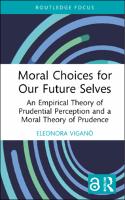Chapter 3 How should we treat our future selves? The moral requirements of prudence to one’s present and future selves
Proposal review
Abstract
This book investigates the relationship between our present and future selves. It focuses specifically on diachronic self-regarding decisions: choices involving our earlier and later selves, in which the earlier self makes a decision for the later self. The author connects the scientific understanding of the neurobehavioral processes at the core of individuals’ perceptions of their future selves with the philosophical reflection on individuals’ moral relationship with their future selves. She delineates a descriptive theory of the perception of the future self that is based on empirical evidence and that systematizes and integrates the current theoretical literature. She then argues for the morality of prudence and interprets diachronic self-regarding decisions as decisions between two agents— the earlier and later selves—that belong to the realm of intergenerational ethics, which regulates the relationship between contemporary people and future generations. Finally, the author provides a moral theory of prudence based on respect for one’s agency. This theory identifies what the present and the future selves owe to one another in diachronic self-regarding decisions. Moral Choices for Our Future Selves will be of interest to scholars and students working in ethics, moral psychology, philosophy of mind, and cognitive science.
Keywords
A; An; and; Eleonora; Empirical; for; Future; Moral; of; Our; Perception; Prudence; Prudential; Selves; Theory; ViganoDOI
10.4324/9781003122142-4ISBN
9780367634933, 9780367640958, 9781003122142Publisher
Taylor & FrancisPublisher website
https://taylorandfrancis.com/Publication date and place
2023Grantor
Imprint
RoutledgeClassification
Philosophy
Ethics and moral philosophy
Cognition and cognitive psychology


 Download
Download